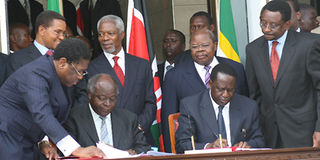Key events in Kenya since signing of National Accord

President Mwai Kibaki and Prime Minister Raila Odinga during the signing of the Coalition deal on February 28, 2008. Monday marks the third anniversary of the Grand Coalition Government. Photo/FILE
| February 2008 | National Accord and reconciliation Act signed by President Kibaki and Prime Minister Raila Odinga. |
| March 2008 | Parliament convenes to begin to ratify the Act |
| April 2008 | Cabinet of Grand Coalition government announced |
| May 2008 | President Kibaki attends fundraiser for Internally displaced persons at KICC |
| September 2008 | The Independent Review Commission (Kriegler) report released |
| October 2008 | Waki report on the Post Election violence released. (Download: The Waki Report) |
| November 2008 | Truth Justice and Reconciliation Act 2008 signed into law. (Read: Kibaki signs truth team Bill) |
| May 2009 | Prof Philip Alston, a United Nations Special Rapporteur, releases report on extra judicial killings by police in the country. (Read:Death Squads: Alston's final report) |
| June 2009 | President Kibaki denies the grand coalition is in crisis in the wake of criticism at home and abroad for internal bickering, failing to tackle corruption, slow progress on political reform, and inability to stem economic decline. |
| July 2009 | President Kibaki appoints TJRC commissioners. (Read: Kenya Cabinet agrees on TJRC) |
| August 2009 | US Secretary of State Hillary Clinton criticises Kenya for failing to investigate the deadly violence after the 2007 election. (Read: Secrets of Clinton’s private meetings) |
| October 2009 | The government says it will co-operate with the International Criminal Court (ICC) to try key suspects in post-election violence. (Read: We will help Ocampo in trials: Raila) |
| October 2009 | US government imposes travel ban on Attorney General Amos Wako whom they accuse of obstructing reforms. (Read: US slaps visa ban on govt official) |
| September 2009 | President Kibaki appoints commissioners to the National Cohesion and Integration Commission. (Read: Kibaki names team to lead national healing) |
| January 2010 | The ICC prosecutor presents the Kenya situation to the pre-Trial Chamber seeking authorisation to open a case against perpetrators of the 2007 post election violence. (Read: Ocampo writes to judges over threats) |
| February 2010 | President Kibaki overturns a decision by Prime Minister Odinga to suspend the Agriculture minister William Ruto over graft allegations. (Read: Kibaki overrules PM over ministers' suspension) |
| August 2010 | Kenyans vote to approve a new constitution in referendum. (Read: 'Yes' team declares referendum victory) |
| August, 2010 | Promulgation of the new constitution. (Read: Kenya takes its place among world’s top democracies) |
| November 2010 | Reports by whistleblower website Wikileaks quotes US government describing Kenya as a ‘swamp of corruption.’ (Read: US envoys see Kenya as a ‘swamp’ of corruption) |
| December 2010 | International Criminal Court Prosecutor Luis Moreno Ocampo names six masterminds of the post election violence including Deputy Prime Minister Uhuru Kenyatta, Head of Public Service Francis Muthaura. (Read: Ocampo names Kenya chaos suspects) |
| January 2011 | President Kibaki nominates for individuals to four key constitutional offices. Prime Minister Raila Odinga says he was not consulted. (Read: Raila says judiciary appointments 'unconstitutional') |
| January 2011 | Kenya Secures the African Union’s support to have cases at the International Criminal Court deferred. (Read: AU endorses Kenya bid for ICC deferral) |
| February 2011 | President Kibaki withdraws the names of his nominees to four key constitutional offices. (Read: Kibaki withdraws list of nominees) |
| February 2011 | Justice Evan Gicheru’s term as Kenya’s Chief Justice expires. (Read: Exit Gicheru: Lessons for the new chief justice) |


